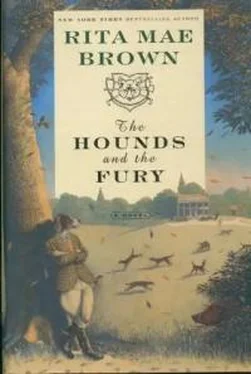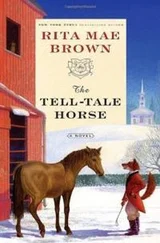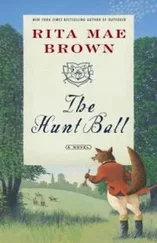“Or old age,” Sister remarked. “’Course, you can slow old age down, throw marbles under his feet.”
Another set of headlights shone on the wall. The sun now cast long beautiful shadows over the snow. The stable and farm buildings glowed.
Dragon stood up.
Two doors slammed, although the second one took longer than the first.
A knock on the door soon followed.
“Come in,” Sister beckoned.
Tootie, Val, and Felicity trooped in.
Betty naturally assumed they were still upset over yesterday’s events.
“Sister, can we talk to you?” Val asked, ever the leader.
“You can, and you can talk in front of Shaker and Betty. Whatever you say stays here. We’re full of secrets.” She smiled.
Tootie looked at Shaker, then Betty, then Sister. “We need your advice.”
“We have a problem,” Val jumped in.
“No, we don’t.” Felicity showed a new, rebellious streak.
“Felicity, I can’t believe you’re saying that.” Val was ready for an argument.
“It’s not exactly a problem, it’s”—Tootie struggled—“new information.”
“It’s a goddamned problem,” Val blurted out, forgetting she was in the presence of adults, then quickly realizing it. “Sorry.”
“You owe me one dollar.” Felicity’s jaw set as she held out her hand.
“I can’t believe you.” Val pulled money out of her pocket, peeled off a dollar, and slapped it in Felicity’s hand, hard.
“Girls, it’s first light. This must be important.” Sister gently pushed them along.
“Felicity has lied to us.” Val seemed stricken.
“I didn’t lie. I didn’t know until I went to the doctor.” Felicity defended herself.
“Sure. You said you were allergic to flour!” Val’s face turned crimson.
“Val, put yourself in her shoes,” Tootie counseled.
“I’d rather not.” Val crossed her arms across her chest, then noticed that Dragon was observing every move.
Felicity finally said, in a calm voice, “I’m pregnant.”
Shaker stood up and offered Felicity his chair. That surprised her, for she hadn’t thought through all the consequences of her condition.
Betty, motherly, put her arm around Felicity’s shoulders.
Sister also stood, put her arm around Tootie, and pulled Val to her for a hug. Then she gave Felicity a big hug. “Everything will be fine.”
Sister burst into tears not because of Felicity’s news, not because of yesterday’s drama, but because deception, truth, death, and life were happening all at the same time. It was exactly as it should be.
SOME USEFUL TERMS
Away—A fox has “gone away” when he has left the covert. Hounds are “away” when they have left the covert on the line of the fox.
Brush—The fox’s tail.
Burning scent—Scent so strong or hot that hounds pursue the line without hesitation.
Bye day—A day not regularly on the fixture card.
Cap—The fee nonmembers pay to a hunt for that day’s sport.
Carry a good head—When hounds run well together to a good scent, a scent spread wide enough for the whole pack to feel it.
Carry a line—When hounds follow the scent. This is also called “working a line.”
Cast—Hounds spread out in search of scent. They may cast themselves or be cast by the huntsman.
Charlie—A term for a fox. A fox may also be called Reynard.
Check—When hounds lose the scent and stop. The field must wait quietly while the hounds search for the scent.
Colors—A distinguishing color—usually worn on the collar but sometimes on the facings of a coat—that identifies a hunt. Colors can be awarded only by the master and can be won only in the field.
Couple straps—Two-strap hound collars connected by a swivel link. Some members of staff will carry these on the right rear of the saddle. Since the days of the pharoahs in ancient Egypt hounds have been brought to the meets coupled. Hounds are always spoken of and counted in couples. Today hounds walk or are driven to the meets. Rarely, if ever, are they coupled, but a whipper-in still carries couple straps should a hound need assistance.
Covert—A patch of woods or bushes were a fox might hide. Pronounced cover.
Cry—How one hound tells another what is happening. The sound will differ according to the various stages of the chase. It’s also called “giving tongue” and should occur when a hound is working a line.
Cub hunting—The informal hunting of young foxes in the late summer and early fall, before formal hunting. The main purpose is to enter young hounds into the pack. Until recently only the most knowledgeable members were invited to cub hunt, since they would not interfere with young hounds.
Dog fox—The male fox.
Dog hound—The male hound.
Double—A series of short, sharp notes blown on the horn to alert all that a fox is afoot. The “gone away” series of notes is a form of doubling the horn.
Draft—To acquire hounds from another hunt is to accept a draft.
Draw—The plan by which a fox is hunted or searched for in a certain area, like a covert.
Drive—The desire to push the fox, to get up with the line. It’s a very desirable trait in hounds, so long as they remain obedient.
Dwell—To hunt without getting forward. A hound who dwells is a bit of a putterer.
Enter—Hounds are entered into the pack when they first hunt, usually during cubbing season.
Field—The group of people riding to hounds, exclusive of the master and hunt stuff.
Field master—The person appointed by the master to control the field. Often it is the master him- or herself.
Fixture—A card sent to all dues-paying members, stating when and where the hounds will meet. A fixture card properly received is an invitation to hunt. This means the card would be mailed or handed to a member by the master.
Gone away—The call on the horn when the fox leaves the covert.
Gone to ground—A fox who has ducked into his den or some other refuge has gone to ground.
Good night—The traditional farewell to the master after the hunt, regardless of the time of day.
Gyp—Another term for a female hound.
Hilltopper—A rider who follows the hunt but does not jump. Hilltoppers are also called the “second field.” The jumpers are called the “first flight.”
Hoick—The huntsman’s cheer to the hounds. It is derived from the Latin hic haec hoc, which means “here.”
Hold hard—To stop immediately.
Huntsman—The person in charge of the hounds in the field and in the kennel.
Kennelman—A hunt staff member who feeds the hounds and cleans the kennels. In wealthy hunts there may be a number of kennelmen. In hunts with a modest budget, the huntsman or even the master cleans the kennels and feeds the hounds.
Lark—To jump fences unnecessarily when hounds aren’t running. Masters frown on this, since it is often an invitation to an accident.
Lift—To take the hounds from a lost scent in the hopes of finding a better scent farther on.
Line—The scent trail of the fox.
Livery—The uniform worn by the professional members of the hunt staff. Usually it is scarlet, but blue, yellow, brown, and gray are also used. The recent dominance of scarlet has to do with people buying coats off the rack as opposed to having tailors cut them. (When anything is mass-produced, the choices usually dwindle, and such is the case with livery.)
Читать дальше












